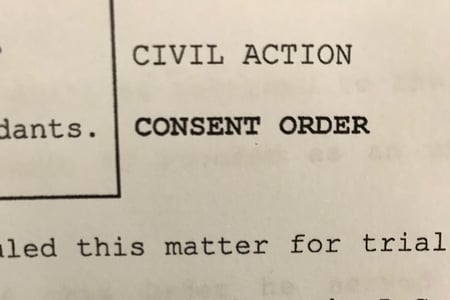 Sometimes you have to give something up to get something else. That's the case for recent clients of our firm who agreed to a consent order that involved them consenting to judgment and withdrawing their contesting answer to the foreclosure complaint in exchange for getting more time before judgment was entered and avoiding a trial.
Sometimes you have to give something up to get something else. That's the case for recent clients of our firm who agreed to a consent order that involved them consenting to judgment and withdrawing their contesting answer to the foreclosure complaint in exchange for getting more time before judgment was entered and avoiding a trial.
A little background on foreclosures is required to explain what a consent order is. In judicial foreclosure states like Florida, New Jersey, New York, Pennsylvania, and Illinois, a lender must sue a homeowner in a civil lawsuit in order to foreclose on their home.
If you're served a foreclosure summons and complaint, which starts the lawsuit, you have the right to answer it and deny the bank's claims and raise your own defenses. And you should, if you have any desire to keep your home. It can buy you a lot of time in your home, during which you can work toward a permanent solution.
The legal process can take years, especially if you answer the complaint and raise the appropriate defenses, but if you don't achieve a permanent solution eventually the bank will move to enter a final judgment of foreclosure that allows them to sell your home.
If you're trying to avoid foreclosure, you'd obviously prefer to not have judgment against you. However, in some cases it may be worth it to agree to it. It all depends on what your options are and what you get for it.
What Is A Consent Order?
A consent order (also called an agreed order or consent judgment) is a voluntary agreement between parties to a dispute. It is legally binding and carries the same weight as a court order.
In foreclosure cases, homeowners and banks may agree to a consent order if its terms benefit them both. The clients I mentioned earlier, and their bank, agreed to a consent order for that reason. Here are some excerpts of that order:
“The Court having scheduled this matter for trial...and the parties having amicably resolved the Contesting Answer of the said Defendants and for good cause shown; It is…
ORDERED that the Defendants' contesting Answer is hereby withdrawn; and it is further
ORDERED that the Defendants' Answer shall be deemed non-contesting... and it is further
ORDERED that the Plaintiff shall not cause Final Judgment in Foreclosure to be entered for a period of ninety (90) days from the date of entry of the within Order; and it is further
ORDERED that Plaintiff's Motion for Summary Judgment is hereby withdrawn; and it is further
ORDERED that trial of the within matter...is hereby canceled”
 So, you can see that the consent order is issued by the court and orders terms that the parties, defendants (homeowners) and plaintiff (lending bank), "amicably resolved". The order states that the matter was scheduled for trial, but that it is canceled. That benefits both parties because a trial can be expensive to prepare for and takes time. It's better to come to a resolution than to go to trial, if possible.
So, you can see that the consent order is issued by the court and orders terms that the parties, defendants (homeowners) and plaintiff (lending bank), "amicably resolved". The order states that the matter was scheduled for trial, but that it is canceled. That benefits both parties because a trial can be expensive to prepare for and takes time. It's better to come to a resolution than to go to trial, if possible.
The order also states that the defendants withdraw their answer to the complaint, which contested the charges it contained. That's the big sacrifice the homeowners are making because they're giving up their defenses. But at that point they didn't have many valid defenses available anyway, and the bank was closing in on judgment.
Consent Order Buys Time
The big benefit the homeowners got from the consent order is that the bank agreed to not move to enter final judgment of foreclosure until after 90 days from the entry of the order. That's huge because what our clients needed was more time to apply for a loan modification, which was their only option for avoiding foreclosure and keeping their home.
In part because of the 90 days the plaintiff agreed to wait until entering final judgment, our clients applied for and were approved for a trial loan modification! As of this writing they've made two of their three trial modification payments and we anticipate that they will make the third, be granted a final loan modification, and the foreclosure case will be dismissed.
Hiring An Attorney
Without the consent order, our clients may not have been able to get their trial loan modification. Clearly, it can be useful in the right circumstances. But it could also be risky if you give up too much and don't get enough in return, or if you consent when there may have been better options available to you. It's something you should only do when you know it will help you achieve some specific goals.
It would be best to have a professional with good judgment and lots of experience advise you on what to do when you're fighting foreclosure. They could help you decide if and when it's time for a consent order, and they can help you negotiate the best terms if you do need one.
Unless you have extensive experience with foreclosures and loan modifications, you should consider hiring an attorney who can work toward getting you the best outcome. Look for a law firm with a proven record of helping people in your situation. It could make the difference between losing your home to foreclosure and keeping it with a great loan modification.










